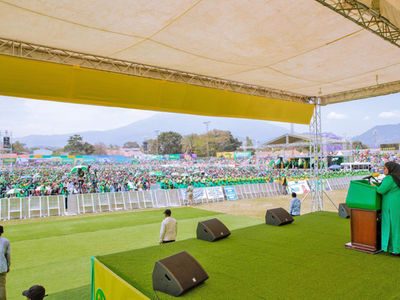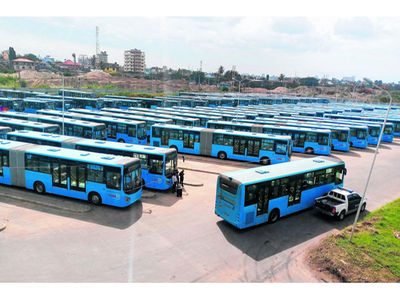The Executive Director of Global Info Analytics, Mussa Dankwah, has fired back at critics within the governing National Democratic Congress (NDC) who have accused his company of fueling succession debates and distracting government appointees from their mandate.
He defended his outfit’s credibility and independence, following criticisms from sections of the NDC over the release of polls on the party’s internal succession race.
In a social media interaction, Mr Dankwah, dismissed claims that the firm’s surveys are politically motivated, stressing that Global Info Analytics is a private, independent company that operates without interference from any political party.
However, The Herald’s investigations have revealed that Mussa Dankwah, the man behind Global Info Analytics, has been operating more as a businessman than an independent pollster, using opinion surveys as a money-making venture.
In 2020, Mr Dankwah approached the Akufo-Addo administration, marketing his polls to senior figures in government and the then-ruling New Patriotic Party (NPP). However, he was dismissed after his work was deemed unreliable.
The Herald’s findings indicate that he was referred to one Sam Ellis, Director of Personnel at the Office of the President – Jubilee House, who was assigned as his handler.
Mr Dankwah was soon pushed aside, as his surveys were mistrusted and labelled “armchair polling” research, primarily carried out from home using mobile phone calls to supposed respondents.
According to multiple sources, his polls were often compared to those of the National Investigations Bureau (NIB) and Joe Anokye of the National Communications Authority (NCA). They were found to be lacking in credibility. His staff’s strength and variables have been questioned many times.
For instance, ahead of the 2024 elections, several NPP-aligned polls projected a massive victory for the opposition NDC and its flagbearer, John Dramani Mahama, over Dr Mahamudu Bawumia; hence, Global Info Analytics’ polls were of no consequence to key NPP insiders.
Mr Dankwah’s credibility was further tested during the Akwatia by-election, where his polls forecast victory for the NPP. Contrary to his projection, however, the NDC ultimately wrested the seat from the NPP, exposing the flaws in his Global Info Analytics research methods.
However, addressing concerns about the motive behind his polls, Mussa insisted that the company has been conducting polls for several years, including head-to-head polls between key figures in the NDC and NPP, long before party nominations were held.
“Global Info Analytics is a private and independent company. We don’t get told what to do or what not to do. We have been doing this for several years.
“In 2022, we began head-to-head polls between Mahama, Dufuor, and Kojo Bonsu long before the NDC opened nominations. Our polling cycles do not depend on party schedules,” he said.
His comments come amid growing unease within the ruling NDC following recent polls that project the presidential ambitions of key government appointees, just months into President John Dramani Mahama’s administration.
Critics within the party argue that such surveys are fuelling premature succession battles, distracting appointees from their duties, and undermining cohesion in government.
Reports suggest some ministers have already begun building campaign “war chests” and positioning themselves for the 2028 race.
But Mr Dankwah insists that early polling serves the public interest. “Our polling cycle is every three months, and whatever we feel is of national interest, we research. It may not be in the interest of some political parties, but that’s not who we are working for. We are not working for parties, we are working for the country and the globe at large,” he explained.
He defended his company’s decision to release polls on the presidential ambitions of key government appointees, just eight to nine months into the Mahama administration, saying it was necessary to inform the public and other stakeholders about the sentiments of Ghanaians.
“Certain candidates may not be viable, but they may think they are viable,” he said. “By doing early polls and asking voters what they think, they will know where they stand in the public eye, and for that matter, they will not go forward to waste money on a running campaign.”
Responding to claims that the polls are a distraction to government business, Mr Dankwah countered that responsible appointees should remain focused on their mandates.
“Government is serious business. If you cannot focus on your job as a minister because of polls, that is your problem. COVID-19 didn’t stop governments elsewhere from governing despite polls. If you are distracted, then perhaps the government has to decide whether you stay or go,” he said.
According to him, organisations such as Fitch Solutions, Goldman Sachs, and Barclays Capital rely on early data to make informed decisions, and Ghana’s political class cannot expect pollsters to wait for party nominations before conducting surveys.
The Global Info Analytics boss also hinted that his company’s polls may even help the NDC to avoid having a large number of candidates vying for the presidential nomination.
“What we are doing may even help them to avoid having a list of 17 candidates vying for a position, but when people see that they have no chance, they will not contest,” he said.
Mr. Dankwah further argued that early polls help aspirants gauge their viability and avoid wasting resources on campaigns with little chance of success.
“Certain candidates may think they are viable, but when we test them against the public, they realise otherwise. This saves them money and prevents unnecessary crowding of the race.” Mr Dankwah noted.
He stressed that his firm will continue to conduct polls independently, regardless of pressure from political parties.
“We are not an appendage of any party. If we stop because the NDC asks us to, then the NPP will accuse us of bias, and vice versa. We cannot operate at the whims of politicians. What we are doing may even help the parties themselves streamline their contests,” he added.
Mr Dankwah concluded by reaffirming his commitment to transparent research, insisting that the work of Global InfoAnalytics ultimately serves the public and strengthens democratic processes.
The post Why NPP and Jubilee House rejected Mussa Dankwah’s money-driven polls appeared first on The Herald ghana.



